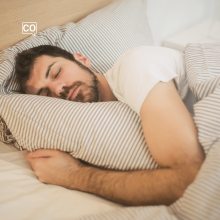Dormir (to sleep) - Futuro perfecto, indicativo (Future Perfect, indicative) - Spanish

Dormir - Conjugation of to sleep in Spanish: Conjugation table, examples and exercises in the future perfect, indicative tense (Futuro perfecto, indicativo).
Futuro perfecto, indicativo (Future Perfect, indicative)
All conjugations and tenses: Dormir (to sleep) - conjugation and tenses - (Spanish)
Syllabus: Spanish lesson - Rutinas diarias (Daily routines)
Conjugation of to sleep in Futuro perfecto
- yo habré dormido I will have slept
- tú habrás dormido You will have slept
- él/ella habrá dormido he will have slept
- nosotros/nosotras habremos dormido we will have slept
- vosotros/vosotras habréis dormido you will have slept
- ellos/ellas habrán dormido they will have slept
Example phrases
- Para mañana a las 7, habré dormido 8 horas. By tomorrow at 7, I will have slept 8 hours.
- Si llegas tarde, habrás dormido más que yo. If you arrive late, you will have slept more than me.
- Cuando regreses, él habrá dormido ya. When you return, he will have already slept.
- Para esa hora, ya habremos dormido bastante. By that time, we will have slept enough.
- Cuando lleguen, vosotros habréis dormido bien. When they arrive, you all will have slept well.
- Al amanecer, ellos habrán dormido profundamente. At dawn, they will have slept deeply.
Exercise: Conjugate the verbs - dormir (to sleep)
Instruction: Choose the correct word, read the sentence out loud and translate.
Show answers Show translationDormir (Futuro perfecto, indicativo)
1. Para mañana a las 7, ... 8 horas.
2. Al amanecer, ellos ... profundamente.
3. Si llegas tarde, ... más que yo.
4. Cuando lleguen, vosotros ... bien.
5. Para esa hora, ya ... bastante.
6. Cuando regreses, él ... ya.